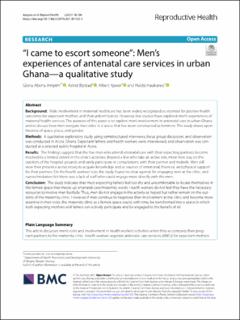| dc.description.abstract | Background
Male involvement in maternal healthcare has been widely recognized as essential for positive health outcomes for expectant mothers and their unborn babies. However, few studies have explored men’s experiences of maternal health services. The purpose of this paper is to explore men’s involvement in antenatal care in urban Ghana and to discuss how men navigate their roles in a space that has been constructed as feminine. The study draws upon theories of space, place, and gender.
Methods
A qualitative exploratory study using semistructured interviews, focus group discussion, and observation was conducted in Accra, Ghana. Expectant fathers and health workers were interviewed, and observation was conducted at a selected public hospital in Accra.
Results
The findings suggest that the few men who attend antenatal care with their expecting partners become involved to a limited extent in the clinic’s activities. Beyond a few who take an active role, most men stay on the outskirts of the hospital grounds and rarely participate in consultations with their partner and midwife. Men still view their presence as necessary to acquire knowledge and as sources of emotional, financial, and physical support for their partners. On the health workers’ side, the study found no clear agenda for engaging men at the clinic, and nurses/midwives felt there was a lack of staff who could engage more directly with the men.
Conclusion
The study indicates that most expecting fathers feel too shy and uncomfortable to locate themselves in the female space that makes up antenatal care/maternity wards. Health workers do not feel they have the necessary resources to involve men fruitfully. Thus, men do not engage in the activity as hoped but rather remain on the outskirts of the maternity clinic. However, if men continue to negotiate their involvement at the clinic and become more assertive in their roles, the maternity clinic as a female space could, with time, be transformed into a space in which both expecting mothers and fathers can actively participate and be engaged to the benefit of all. | en_US |

